
Freiburg, Germany - 2004
By: Pauline E. Abbott, WWWT, Wife of the World’s Worst Tourist
The 55th Meeting of the Aeroballistic Range Association was to take place in Freiburg, Germany in September 2004. I had not spent time with the wonderful Companions of this illustrious group of scientists since we had shared a visit to Sendai, Japan in 2001, and THIS Companion Program promised visits to the Black Forest, to Lake Titisee, to ancient German cities. I looked forward with eager anticipation.
My husband, Jim, and I would be at our home in England in the weeks before the conference, so we consulted the schedules of our friendly local airport, Luton, to find a creative and enjoyable way to journey to Freiburg. The no-frills airline, Easyjet (or Einfachfliegen, as we rejoiced to find it translated into German) had recently introduced flights to a number of European cities, pricing them attractively to entice new customers. We looked for a city in Germany with rail connections, preferably via other interesting cities, to Freiburg, and eventually decided to fly to Dortmund, travelling by rail to Freiburg via Cologne. Jim had visited Cologne first in his formative years, when European art and architecture were unknown to him, and had experienced an epiphany when he stepped out of the railway station in Cologne to be confronted with the mighty splendour of Cologne Cathedral towering up into the clouds above. We planned to make a pilgrimage to this significant site, and to stay in Cologne for one night each way.
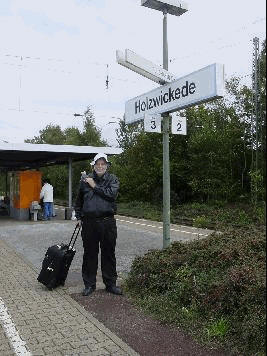
Each journey begins with a single step, and ours began with the annoyingly cheerful tones of Jim’s computer alarm at 6:30 on the morning of 25 September. Our luggage wheels were soon clickety clacking over the lumps and bumps of Kings Road as we pulled them up the gentle hill leading to Flitwick railway station. We left on the 8:09 train for Luton. Steps one, two and three accomplished.
Easyjet runs tiny orange planes, and seating is by group, rather than being assigned. We boarded in group one, and ended up sitting one behind the other in convenient aisle seats. The flight was so short and easy, I hadn’t even time to finish the Telegraph crossword before we arrived.
The force continued with us by providing a shuttle bus to the airport railway station, which is not called Dortmund, as one might suppose, but Holzwickede, and consists of four slabs of concrete and a bulletin board in the middle of a field. The schedule on the board promised trains, and even included the 2:20 to Cologne on which we had reserved seats. Amazingly on the dot of 2:20 a train ploughed its way towards us through the meadow, stopped, and allowed us to alight.
`How many people,’ as we ask ourselves in our frequent reaction to unlikely events, `How many people got on a train at Flitwick-ede this morning, and on a train at Holzwickede this afternoon?’ The answer `two’ seemed, as usual, the most probable.
Holzwickede gave way to Cologne in just about the time it took me to finish my crossword, and to flick through a few pages of my German for Travellers dictionary, in the hopes of reinvigorating a few German language brain cells.
Now in Cologne we were looking for the Ibis hotel, which was said to be right by the railway station. We found a city map on the wall, and scanned it confidently – but why did it highlight every hotel BUT the Ibis? And why was the name HOTEL IBIS written in such eager capital letters right there on the wall above it? Wait a minute – what is this door in the wall??? The answers to these questions dawned on us as we pushed through the door and found ourselves in the lobby of the Ibis, not NEAR the station, but IN the station!
We were assigned to room 411, which turned out to have the amazing properties of looking over the spire of Cologne Cathedral from its window, and Cologne Railway Station from its balcony! How serendipitous is that! I also enjoyed the Ibis’ somewhat narcissistic décor, decorating itself with watercolours of other Ibis hotels throughout the western hemisphere.
There was no time to lose, as we had already lost an hour crossing one time zone, and twilight could be expected fairly soon. Eager to re-create the Trolinger Moment, we stepped outside the hotel’s street door – and there, in its mighty awe-inspiring presence, our eyes traveled up, and up, and up, and up the massive dark shape of the intricately sculpted cathedral to its spire vanishing into the sky above. Truly, this is one of the most impressive architectural feats of the Gothic builders, and we could understand how a younger and less experienced World’s Worst Tourist might have been totally overwhelmed. We were pretty impressed ourselves.
As with most Gothic cathedrals, some repair work was in progress, and we had to negotiate some steps and boardings to arrive at the entrance. This cathedral, begun in 870AD, has suffered major damage and major re-construction throughout its long life. It was destroyed by fire in the ninth century, suffered loss of income in the sixteenth century, modernization in the eighteenth century, was used as a grain storage facility in the early nineteenth century, and survived heavy bombing during World War II. The guide book states that no-one living today will see the cathedral without scaffolding, and quotes a Cologne saying `When the cathedral is finished, the world will end.’
We joined tourists and worshippers in a steady and respectful procession around the interior. The windows were not as colourful as some, but the highest allowed a beautiful blue-gold light to glow on the dark stone. Many candles contributed a warmer glow around the side chapels, and I added one as a prayer for my sister’s health. The cathedral is said to contain the remains of the Three Wise Men, and a special shrine has been made for them.
Outside again, we attempted some photographs, but soon realized the impossibility of including the entire cathedral in one shot.
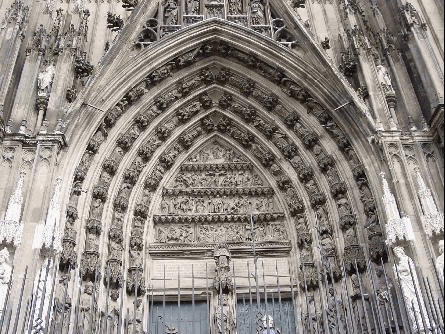
The time had come to seek sustenance, and we turned our attention to the many restaurants offering ethnic delights. Out of many possibilities we chose a little restaurant/bar called Lederer, run by two wonderful elderly ladies. One of these waited on us, bringing us first a couple of beers, then an excellent meal. We seemed to be amongst locals who knew each other, and there was a friendly atmosphere in which we felt included.
Our evening walk took us through the darkening city, as lights came on along the river, and floodlights lit up the cathedral. We bought some macaroons, and took them back to our room where, along with coffee, they made an excellent dessert. We ate watching the BBC News, with the illuminated spire of the cathedral visible through our window.
Sunday 26th September began with gentle rain, which stopped before we finished breakfast, leaving the city clean and refreshed for our sightseeing. Paying our respects once again to the cathedral as we passed, we walked around it and down again to the river. Here we admired the Romanesque beauty of the Great St. Martin Church, along with the medieval buildings clustered around its base. These are painted in clear pastel colours, each with window boxes filled with bright flowers and foliage cascading down.
As we retraced our steps, partly through the modern shopping streets, we noticed a chain of these streets cordoned off, and clusters of people beginning to line a route through the town. Even as we put together clues – there were signs marking numbers of kilometers – the first few runners in a city marathon came through, to scattered but enthusiastic applause. The trickle of runners became a flood as we watched, the first obviously athletes in prime condition, but later groups including the very old, the very young, and those just out to enjoy the event.
It was now time to leave Cologne, passing conveniently through the Ibis to pick up our luggage and straight onto the station. We checked the schedules, found our platform, and bought some sandwiches for the journey. We even, in the course of these checks, realized the schedules told us exactly where to stand on the platform to be at our designated carriage. After a pleasant journey through beautiful German scenery, we arrived in Freiburg at 4:40. We surmised our hotel was near the station, as it was on Eisenbahnstrasse, and so it was, within easy walking distance. We were soon checking in to the Victoria Hotel.
The conference was to take place at the Ernst Mach Institute, and would begin this evening with registration and a reception. One never knows, at the beginning of a conference, quite what the dress code will be. I remembered in Japan the first reception turned out to be very formal, and introduced us to Japanese-style eating in a delightful way. But that had been within the same hotel where we were staying. Today we were to walk through damp and grayish weather to a scientific establishment – ball gowns, presumably, not required? Under a raincoat – which could be discarded – I popped a velvet jacket over a white sleeveless top and black pants, figuring I could adjust this outfit up or down the formality scale after I caught sight of the first other Companion. Most ladies had reached the same kind of compromise, so no one had to throw rocks at me for social ineptitude – well, not over my outfit, anyway!
As it turned out, the reception consisted of champagne and hors d’oeuvres, consumed as we mingled in convivial groups around elbow-height tables. The first Companion I met was Jo, and we greeted each other happily. She was kind enough to say she had enjoyed my write-up of the Japanese conference, and had used it to remember details of where we had been, and to put her pictures in order. As I basked in this compliment, however, up came Don. He, too, recalled my write-up.
`You’re the one,’ he said, `who referred to `senior wives’. I don’t think my wife liked that!’ Casting my mind back, I remembered the phrase, and hastily explained that `senior’ had meant those married to important officials in the ARA (such as himself) who had experienced many conferences and were graciously welcoming to newcomers.
`Well, another thing,’ he went on, `you said my wife had a charming southern accent. I have a charming southern accent, and you didn’t mention mine! You’d better make sure you put me in your next story.’
OK, Don, here you are! You have a charming southern accent, you’re obviously a rich and powerful man, handsome, intelligent ….
Larry soon joined his wife, Jo, after which we met and greeted Rita and Vern, and Marc and Marlyse. Peggy, Don’s wife, came along, with Ali, whom I hadn’t met before. Professor Jeung from Seoul introduced his daughter, Audrey, who was accompanying him and her grandmother. Every single one of us had charming accents from all over the place.
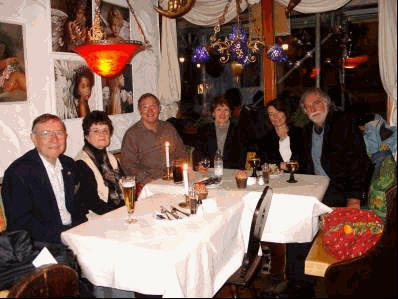
These reunions were taking place during a steady imbibing of champagne, and we began to feel the need for some real food to restore our equilibria. Jim and I, Larry and Jo, Rita and Vern, recalled that the last time we had eaten out as a group we had shared pizza in Japan, chosen from pictures on an all-Japanese menu. Could we repeat such a successful experience? The center of town was roughly half-way between our two hotels, and Jim remembered a restaurant in the center of Freiburg called The Golden Angel, so we set out to find it. We found the town center easily, using the prominent landmark of the spire of the minster, but The Golden Angel was nowhere to be found. There were any number of good-looking eating places, though, so we picked a menu we liked and filed inside. Great was our surprise to find angels everywhere in its décor. It WAS The Golden Angel, but its name over the door had been obscured by scaffolding! We were led to a table by the window where we chatted and reminisced happily over an excellent meal. Later Jim and I walked home with Larry and Jo through the darkening streets, and ended the day with hot chocolate in our room.
The conference really began today, Monday 27th September, and so did the Companion Program. Jim and I ate breakfast in our hotel, then walked in together to the Ernst Mach Institute, where he was to work all day, and I was to meet the Companions for a walking tour of the city of Freiburg. The first happy face to meet my eyes as I entered the meeting room was Chieko, wife of Professor Takayama, who had been our hostess in Japan. We exchanged hugs and smiles and greetings. Chieko introduced me to other ladies I did not know, sitting there with her. I met Pamela (originally from Bermuda, now from Washington) and Gloria (from England). There was much exchange of news, and families, and Chieko, it turned out, had been traveling to one conference after another for some months. As she told us of some of the places she had visited, I enjoyed our gradual getting used to each others’ `charming accents’.
`I was in Wuh Suh,’ said Chieko.
`Where? Oh, Wor Sor,’ as light dawned on Gloria.
`Where? Oh, you mean Wah Sah,’ concluded Peggy.
Odile arrived, accompanied by her daughter, Emma, aged three, who soon realized her job was to entertain the group with her dancing and acrobatics, and to teach us all to speak French. Ali and Lily were now both here, two beautiful ladies from the Netherlands. Rita had the idea of using her Christmas letter to catch us up on news of her family, and it was just passing around when our two Korean ladies, grandmother and granddaughter, arrived. Audrey was a kindly caretaker for her grandmother, who spoke no English, but before anyone realized this Rita’s letter was pressed into her hand. The good lady had no idea what it was, but took it gratefully and began to fold it up to put it away. Rita retrieved it with smiles and bows, which became our major means of communication with our Korean friend.
Our tour guide for today was Christine, who arrived right on time, with long, blonde hair, multi-coloured pants, and umbrella. We got organized, and filed out behind her.
Stepping out of the Ernst Mach Institute we were first of all in an area of the university consisting mostly of student apartments and other apartments.
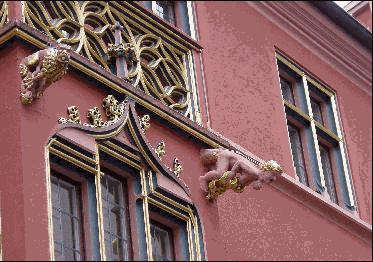
`These,’ Christine explained, `are not medieval,’ but once we crossed the Friedrichstrasse we were into the area of the town bordered by the ancient city walls. Even then, appearances could be deceptive. Certainly most of the buildings in the center of Freiburg look old, but, like many German cities, Freiburg suffered heavy bomb damage in World War II. After the war, many buildings were restored to their former appearance, and the result now is a pleasing mixture of building styles blending the truly ancient with the modern reconstruction.
The streets, also, appear at first to be cobblestoned in medieval fashion, but in fact these are modern mosaics. Local stones of different colours have been shaped into ovals, but with flat surfaces, much easier on the feet than true cobblestones. In many places they have been formed into symbols, for instance, a boot outside a shoe store, or a bottle outside a pharmacy. In the center of town mosaics on the Munsterplatz form the coats of arms of Freiburg’s twin towns, in England (Guildford), the United States (Madison), Japan (Matsuyama) and Iran.
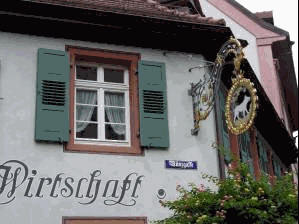 Another
pleasing sight met our eyes on the Munsterplatz. Each morning an open air
market is held here, with fruit, flowers, vegetables and spices for sale.
This morning the market is aglow with fall colours, with sunflowers,
dahlias, and all kinds of squash. The spices scent the air, among the
recognizable ones cinnamon and lavender.
Another
pleasing sight met our eyes on the Munsterplatz. Each morning an open air
market is held here, with fruit, flowers, vegetables and spices for sale.
This morning the market is aglow with fall colours, with sunflowers,
dahlias, and all kinds of squash. The spices scent the air, among the
recognizable ones cinnamon and lavender.
We had approached the Munster from its currently most attractive side. Christine told us she had done this on purpose as, unfortunately, the imposing west door was undergoing repair, and was hidden by scaffolding. (This is due to be removed next week!) However, from this side we can admire the elegant pink sandstone buttresses.
Our umbrellas had to be raised for a while during our guide’s description of the Munster and its surroundings, but the sun came out again as she led us to a part of town called Oberlinden. Christine grouped us there under the very linden tree for which this area is named. We were not an easy group to address `as one’ – there were several different languages amongst us, and old and new friendships were being activated as we walked. Gloria and I were discovering a bond of Englishness, Chieko took Doo Nam Cho under her friendly wing, somehow communicating great goodwill without need for words, and Rita declared herself a substitute grandmother for Odile’s little daughter. I was interested to see how determined Christine was that we would each hear all she had to say – she would always wait until everyone was assembled, and quiet, before she began each informative discourse. And `everyone’ included three-year-old Emma!
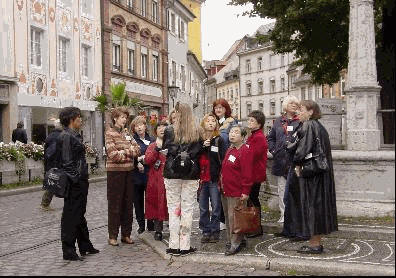 We passed by
the historical Schwabentor, one of the old gates of the city, turning back
towards the center to walk through the Oberlinden area. Narrow cobbled
streets were lined with picturesque buildings, a mixture of dwellings and
little stores. Many of the walls were painted with designs, or old Gothic
lettering, telling their names or the names of the traders. Doors and
windows each had their own character, few of them square or regular. Many
of the doorways had above them a hanging sign to tell what trade was plied
inside. Up the walls and stretching across above our heads from one side
of the street to the other were thick green vines.
We passed by
the historical Schwabentor, one of the old gates of the city, turning back
towards the center to walk through the Oberlinden area. Narrow cobbled
streets were lined with picturesque buildings, a mixture of dwellings and
little stores. Many of the walls were painted with designs, or old Gothic
lettering, telling their names or the names of the traders. Doors and
windows each had their own character, few of them square or regular. Many
of the doorways had above them a hanging sign to tell what trade was plied
inside. Up the walls and stretching across above our heads from one side
of the street to the other were thick green vines.
A channel of water, between eight to twenty-four inches wide at different points, ran alongside many of the city sidewalks. The water appeared clean and fresh, and flowed constantly. Christine explained that the concept dates from medieval times, when the water was used by housewives for their household chores, such as washing clothes, and also provided a primitive fire insurance in times when most buildings were made of wood. More recently these streams, or Bechler, have been incorporated into the city planning as an attractive feature, both visually, and also to provide some freshness to the air in the hot summers. By the way, one should be careful in stepping over or around the Bechler – anyone who falls in is said to be destined to marry a Freiburger.
As we returned in the direction of the Munster I almost lost the group entirely as I got involved in photography. They had disappeared into the dark interior, and I feared Christine might be silenced by the absence of one of her audience. The darkness had apparently concealed my defection, and I was able to join the group quietly in the middle of her description of the stained glass windows.
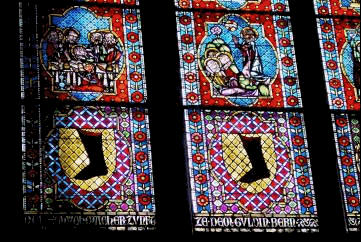
I was of course familiar with the glorious aims of stained glass masters, to provide a foretaste of the light of heaven streaming into a church, and to familiarize an illiterate population with Biblical stories and religious legends through the use of visual images. Christine was pointing out the story of Katherine of Alexandria, that Katherine who was martyred on a wheel. She reminded us that medieval worshippers would be familiar through repeated exposure with the symbols portrayed in the window. There was the wheel – that must be Katherine. Sponsors had also used visual symbols to make sure everyone knew who had generously donated to the church – the guild of shoemakers’ window included a large boot, the guild of tailors had incorporated a pair of scissors into their design.
Time often moves erratically within religious shrines, and I think I caught a glimpse of a time portal then. What if the aim of universal literacy is just a glitch? What if the alphabet, reading and writing, will always be powerful `magic’, understood and used only by an elite? What if the mass of humanity will always be swayed by powerful visual imagery, rather than the discernment of carefully reasoned words? What if power will always reside in those who know how to persuade and manipulate huge numbers by direct access to more instinctive areas of the brain? Civilized societies are losing the battle to train youngsters to read and reason to the appeal of the visual images of television, video games and advertising logos. There’s the wheel – that must be Katherine. When we see golden arches, who doesn’t know what they symbolize?
Our official tour ended as we left the cathedral, Companions had different ideas of how to spend our free time for the rest of the afternoon, and split into various groups. I was among a group of six – the others, Jo, Rita, Pamela, Gloria and Annette – who decided to find something to eat, and a place to sit down and eat it.
There was no shortage of tempting restaurants, and we settled on the Oberkircher, overlooking the Munsterplatz. `Sechs Personen’ was rather a large number to accommodate at rush hour, but an enterprising manager opened up a private room and seated us comfortably around the large table which filled it. Over a leisurely lunch of various soups and salads we exchanged more life histories and family backgrounds. Always an instigator in this, Rita proudly tells us about her 91 year old mother and how fit and well she is, and asks genuinely interested questions of all of us. Time passes pleasantly, and it is nearly three o’clock when we leave!
As Jim had climbed the cathedral tower on a previous visit, I wasn’t sure if it would be a priority of his to do it again in his limited free time, so I decided to spend this afternoon climbing it alone. The usual dire notices forewarned tourists that the climb was steep, difficult, treacherous, claustrophobic, shouldn’t be attempted by the old, infirm or pregnant etc. Thus encouraged, I set off up the first 207 steps, which formed a spiral staircase. Certainly it was narrow, but uncrowded on a Monday afternoon, so it was easy to squeeze by in a couple of encounters. The fee for climbing the tower, one and a half euros, was payable only on reaching the kiosk at the top of this staircase – a magnanimous gesture, I thought. At this point one could catch one’s breath on the pretext of wandering around on that level, looking at the bells, and browsing among a few postcards and souvenirs.
After this rest, I set off again on the next, slightly narrower, spiral which brought me to a viewing platform. Here one could walk around and peer out on all sides, but through stone tracery, and, unfortunately, obstructing scaffolding. Now it was time to head for the top, which I reached after only a few more steps. I particularly wanted to look down on the stone angel which Jim had photographed on his visit, and who was barely visible from street level. I found her, but was unable to look down, as he had. I discovered you would have to be about a foot taller than I am to lean over the tall parapet! Undaunted, I took a few steps back down the staircase and hung on with one arm, stretching my other arm, with camera, out as far as I could reach. I managed a view of the angel from the side, and thus completed my pilgrimage.
On the way back down I bought a guide book and some postcards, then walked back through the town to the Victoria Hotel. I arrived there at about 4:30. Jim returned just after five. We made tea, and exchanged news of our respective days and encounters. It is always interesting, meeting separate halves of couples this way, to match up information on the `other halves’.
`Gloria’s husband, Peter, works at the Tower of London now he’s retired.’
`I didn’t know that.’
`Pamela is gorgeous.’
`Really? Well, Dennis prides himself on being a connoisseur of fine wines and beautiful women.’
Since it wasn’t dark yet, we followed another conference tradition. I walked Jim around the places I’d been shown today, and amazed him with my fund of cultural and historic information about each one. We met Ali and her husband doing the same thing. We also discovered another cultural difference in our reactions to ornately carved cuckoo clocks. We shared a preference for eating only lightly this evening so, as dusk fell and the stores began to close, we bought bread, cheese, tomatoes and chocolate, the makings of a nutritious picnic which we ate back in our room.
An early rising was called for on Tuesday 28 September, as Jim was the first speaker at the conference today, and I was due to meet the Companions at the railway station to travel to Lake Titisee. After breakfast we set off in our different directions, Jim in white shirt and tie and clutching his notes, I in cobblestone-friendly sneakers and carrying my camera.
On the way to the station I passed the central Post Office, so went inside to buy stamps and mail a couple of postcards. My fluency in the German language was such that this was accomplished much more quickly than I expected, so I was actually early for the meeting. I spent the time browsing in the station bookstore, and invested in a German novel. I thought perhaps if I persisted in reading this, the German language areas of my brain might be re-invigorated. Worth a try.
The ladies met as arranged at 10:00, and we were joined this morning by Peter. He explained that now he is retired he pays his own way at the conference, therefore is entitled to play truant occasionally if he wants to. I was delighted to meet him, and asked immediately about his job at the Tower of London, which Jim had mentioned. Peter was pleased to tell me how he had volunteered to assist in an educational program, but had immediately been recognized as over-qualified, so now worked in the classifying and cataloguing of weapons displayed at the tower. He has a pass to enter the tower whenever he likes, and is proud to be working for the queen. I expressed my admiration for his prestige, and vowed to visit him there.
Meantime, we were now under the leadership of Gabrielle, another tour guide. She had a list of Companions, some of whom we knew were not expected, but she suffered great over-conscientiousness, and counted and re-counted us several times before she bought tickets. Fortunately this was accomplished just before the train arrived, and we joyously climbed upstairs when we discovered it was a double-decker. This way we got the best views of the beautiful countryside we passed, its trees and gorges, though I am sorry to say that it was somewhat overcast at this time. I sat with Chieko, and opposite Peggy, Pamela, Rita and Jo. Rita is obviously intrigued with Pamela, having known Dennis for some time, and is unflinchingly direct in her questions and comments. Asking Pamela what work she does, and how old she is, she is quite open about her surprise when Pamela turns out to be a mature student with grown children. `My goodness,’ exclaims Rita, `I thought Dennis had found himself a child bride, but you’re not!’
We soon arrived at Titisee, but were delayed in our progress by Gabrielle’s insistence, once more, on reciting all the names on her list and needing reassurance that she had never collected some of them. We suggested perhaps she could memorize a number, or that each of us could be responsible for our train-seat-buddy, but tour guide training evidently frowns at such dereliction of duty. She also walked us sternly past rows of stores, in spite of some anguished pleas to stop and promises to catch up later. No, she must show us all EXACTLY where to catch the boat, before she let us loose, because if we missed that boat there would be NO LUNCH FOR US.
We reached the quay together, at which point there was now only twenty minutes shopping time left. We must be back at 11:40. With squeals of anguish hardened shoppers dived into the nearest stores to amass crystal candlesticks and carved cuckoo clocks before the deadline. I frittered my twenty minutes on a quick look inside a Christmas store, then a short walk along the lakeside photographing the boats and scenery.
At 11:40 we were all back. Gabrielle was still busy going over our names once more when punctually at 11:45 a boat left the quay behind her. `Was that our boat?’ someone asked. Gabrielle turned in dismay, panicked briefly, then said firmly `It comes back.’ The experienced teachers amongst us realized her tactical mistake. Whatever happened to NO LUNCH FOR YOU? Threats could have no more power over us. Never threaten what you can’t deliver. It comes back, indeed!
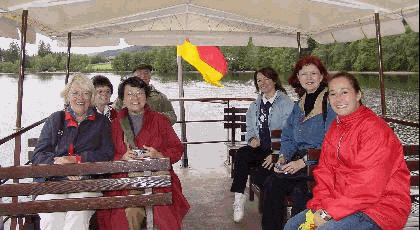
Actually, it may or may not have come back, but what happened next was that Gabrielle appeared to use her tour guide badge to commandeer a small boat called Titus, which we then had to ourselves for the short trip across Lake Titisee to our restaurant. The trip, alas, was rather cold, dark and unphotogenic. One could imagine the beauty of the lake reflecting blue sky and green trees, but at the moment it was all grey on grey. We photographed each other.
The Hotel Alemannenhof, though, fulfilled all our expectations. Situated at the top of a steep slope up from the lake shore, it was built of dark wood, carved into shutters and tracery and waterspouts, and from each of its windows hung showers of brightly coloured flowers.
I sat at a table with Jo, Peggy, Lily, Ali, Pamela and Annette. There was some German consternation when Pamela proved to be vegetarian, but she was soon provided with a delicious pumpkin soup and baked fish, while the rest of us enjoyed the regular menu, complemented with our choice of wine.
I always enjoy cross-cultural discussion, and was delighted to be an impartial observer of an exploration of American lifestyles by Ali and Lily, from the Netherlands.
`We enjoy gardening. What kind of garden do you have?’ Peggy lives on several acres of Texas. `Well,’ she answered, `I pay somebody to mow the part near the house.’
`We grow flowers. Don’t you grow anything?’ `Sure. There’s cactus … it sort of grows by itself.’
`Is it true everyone has a gun? Do you have a gun? Would you shoot anyone?’
Respecting my friends’ privacy, I report no more of the conversation as it got more serious, but I will report my continuing admiration of the awareness and interest the Companions show in each other, their willingness to be open to such questioning, and the respect everyone gives to differing views and lifestyles. (Don, if you’re still reading, you really do have a gracious wife, and she and the other `senior wives’ are a powerful force for international goodwill and understanding.)
Lunch ended really suddenly. `Your boat is waiting!’ We were all ushered out.
The boat wasn’t waiting, and there was time to converse with some ducks. Gloria and I attempted to address them in German - `quacken, quacken’ – which put Peter in mind of a joke about a chicken who went into a library and asked `buk, buk, buk.’ Taking the book home, she shared it with a friendly frog, who dismissed it saying `reddit, reddit, reddit.’ Well, we had enjoyed several glasses of red wine …
Back in the town of Titisee there was time for a little more shopping. I re-visited my Christmas store and bought a Santa as a gift for Colin and Alison. Then, incredibly, I found egg cups inscribed `Jim’ and `Pauline’ which HAD to be added to my egg cup collection.
All too soon we were on the 3:08 train back to Freiburg, and walked, tired but happy, back to our respective hotels. I had time to put my feet up and test my language skills on my newly-acquired German novel, before Jim arrived again just before five o’clock. We were each tired, so indulged in just a short walk together, through the pretty park opposite our hotel. We discovered ANOTHER cultural difference when Jim bent down and began picking up what he called buckeyes. `Those are conkers,’ I informed him, and tried to remember the rules of the games one plays with them. He was mystified.
Yesterday’s picnic had been such a success, we repeated it this evening with our leftovers, adding Brie and slices of plum pastry. We then retired to watch a movie starring Ed Harris, who amazingly spoke fluent German.
Wednesday 29 September was to be a half-day for the conferencees. We were all to meet at mid-day for a combined excursion, scientists and companions, to an Open Air Volksmuseum. To get there, we would enjoy a bus tour through the scenic delights of the Black Forest.
Jim went off to work, while I rose more slowly today, and even relaxed for a while in our room reading my German novel. I had chosen it because it was about the discovery of an angel in a remote Colombian village, and this morning I got to page twenty, following the story of a reporter who reluctantly pursues an interview. I found I was able to get the gist of the story quite well, even though I didn’t know every word, and it was a pleasurable exercise.
The sun was shining, though, and I didn’t want to spend the morning inside, so I set the book aside and took a walk into town. I repeated some of my earlier photographs in this new, warm, golden light. I re-visited the market, and strolled again through the picturesque streets of the Oberlinden.
I had noticed an unusual phenomenon on this trip. In the stores of Cologne, and now of Freiburg, I had seen some fashions I really liked, and that appeared wearable. My eye was caught by some leather jackets in a pretty cream colour, hanging outside a store, and said to be on sale. What could be the harm in trying one on? I went inside and did so. I was helped by a friendly sales clerk who spoke no English, but we communicated in my broken German and through nods and smiles. The first jacket wasn’t the right length, but she found more. They were more expensive, of course, but still `on sale’. We found a mirror to show me my back, the lady modeled for me … I was enjoying the experience so much, it seemed a pity not to buy a jacket to remind me of it! Eventually I chose my favourite, paid for it, and hoped I had made the right mental calculations about the euro exchange rate. (I had.)
Back at the hotel, I discovered the jacket matched my hat. The sun was so bright, I thought a sun hat would be good today, so I donned both hat and new jacket over black top and pants, and set off for the Ernst Mach Institute to meet everyone else. The buses arrived punctually at 1:30. Jim and I secured the front seats in the first bus, intending to get the very best views of the Black Forest as we drove.
Punctually, also, at 1:30, the sky darkened and the rain began. It was a sudden and dramatic change. We left the city and headed out and up through the mountain roads of the Black Forest. The weather got wetter and darker. Heavy mist descended, completely blocking not only the distant views, but sometimes also the road ahead of us. It rained, and it rained, and it rained.
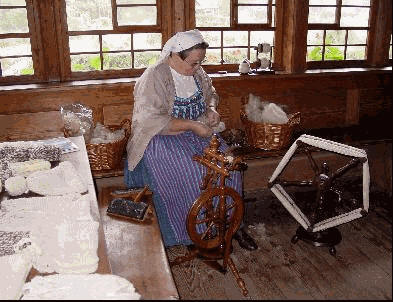
Our guide did her best. She told us the complete history of Freiburg, and of the area through which we were passing. She described the distant views in glowing terms, and apologized over and over again that we could not, in fact, see them. She told us of the pretty villages beyond the mist. She praised our driver for his careful driving, and appealed to him for confirmation that the area around us was amongst the most beautiful in the world. He agreed, and added his apologies to hers. There was nothing to be done but omit the stopping places, and head straight on to the museum.
Arriving at the museum, we all put up our umbrellas and followed our guide through the entrance kiosk. She gallantly did her duty, stopping at every house, describing every building style, demonstrating every implement and farming method. Our group darted quickly under raised umbrellas, dodging deep puddles and sheltering thankfully each time we reached another well-preserved but sodden wooden roof. We were welcomed with sympathy by each craftsperson demonstrating skills such as wood turning and yarn spinning. There was a certain attrition rate, as one by one enthusiasms waned and tourists sneaked off discreetly to the stand at the entrance offering pastries, pretzels, and hot drinks.
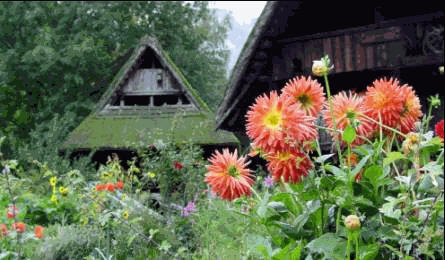
Sue Ellen had joined the conference today. She is the only person I know who takes as many photographs as I do, and we were among the tourists persisting to the end, relentlessly capturing wooden beams, ancient implements, and raindrops dripping from eaves and sills, nasturtiums and dahlias, tourists and tour guide.
Eventually it was time to return to our buses. The weather supplied one more extra forceful deluge as we ran.
Our guide resumed her doleful litany on the return journey. `This would have been such a lovely view … we are passing a picturesque village, its such a shame you can’t see it … the Schonwald waterfall is a famous attraction, its over there beyond the mist …’
At about six o’clock we arrived at the Hirschen Hotel in Glottertal, where dinner was to be served. At this point we would probably have enjoyed anything, but we were delighted to discover the hotel was beautiful, sumptuous and elegant. Teams of efficient waiters welcomed us and ushered us to a large dining room, offering us the first of what turned out to be many glasses of wine as we entered and chose our seats. We sat at a table with David and Sue Ellen, Gloria and Peter, and Larry and Jo. The menu promised three courses and six wines, each with a description of its provenance and virtues. This was all very restorative to our spirits, and we settled in with eager anticipation.
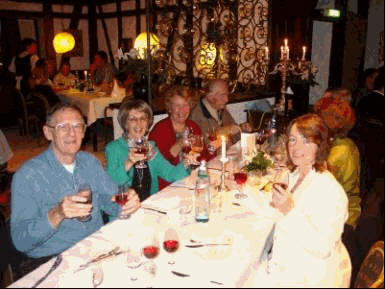
Our first empty glasses were swiftly cleared – leaving five at each place setting. Hot Badische Fladlesuppe was served first, carefully translated on our menu as `Badisch Soup with Fladle’ – very informative! It tasted good, and went well with the 2001Eichberg, we thought.
TWO red wines accompanied the main course, - no, not `a choice of’ – samples of two vintages! Gabrielle was one of the guides again today, and she stood up and read a detailed description of the two, making sure we should understand that though both wines were dry, the 2003 Glottertaler was `silky, with a bouquet’ and the 2002 Glottertaler was `velvet, with a nose’. Larry was quite overcome - `I just love the way she talks,’ he sighed. The English contingent were less respectful, and Gloria, Peter and I could not resist goofing off in Hyacinth Bucket voices into speeches about `cheeky little wines’ with `deep fruit undertones’ etc.
Dinner wound down through two kinds of chocolate mousse to end with a brandy. We enjoyed frank and free discussions ranging through marriage, gardening, art, history, Bush, Kerry, and Blair, all without coming to blows. The warmth of the evening well outweighed the gloom of the day.
Were the conference organizers expecting everyone to rise with a hangover on the morning of Wednesday 30 September? The program announced that the day would BEGIN with a coffee break, at 9:30. The Companions weren’t due to meet until 9:45, so we took the opportunity to sit over a leisurely breakfast at our hotel with Larry and Jo. Larry told us an amusing story against himself. As Jo agreed, he tends to get intrigued by engineering questions, and to ponder interminably, sometimes aloud, about how things work, and why. Yesterday evening on the bus ride home he had regaled Don at some length with his musings on why the spinning wheel at the museum had had such a small wheel. In the course of the `conversation’ Don had fallen asleep!
Jim left for the last session of the conference, and I walked to the station to meet the Companions for our final trip, a train ride to Breisach, with an afternoon boat trip on the Rhine. We found that Gabrielle was our guide again, determinedly reading out her list of 17 names. Only 13 of us showed up, but she was beginning to get to know us now, so although she called the hotels and conference center to confirm no Companion was left behind, she then relaxed into the idea that she could memorize this number and simply count us at each meeting point.
The weather today was bright and sunny, which we enjoyed, though we bemoaned the fact that our menfolk’s only excursion had been so damp and grey yesterday. I sat with Gloria on the train, and we enjoyed a lively conversation about art.
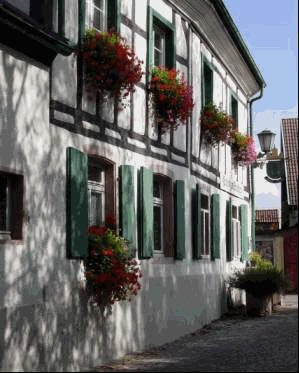
Reaching Breisach, we walked into town along the Zeppelinstrasse to the area called the Unterstadt, or lower town, at the foot of the hill topped by St Stephen’s Cathedral. Lovely old half-timbered buildings lined the streets. As we climbed the hill we could look out over the old city walls to see the Rhine flowing beneath us, with France on its opposite bank.
Sue Ellen is recovering from cancer treatment, and had covered her head in various ways yesterday and today, but today in the sunlight she removed her scarf and revealed her lovely natural re-grown hair, which now forms an appealing grey cap that suits her elegant features and outfits. I enjoyed her optimistic discussion of this, and remember with affection other friends who have grown through this life-changing experience
St Stephen’s stands proudly on a square at the top of the hill overlooking the town. It is Romanesque in style, with rounded arches and narrow windows. Gabrielle took us inside, warning us that photography was strictly forbidden, and that she would have to whisper, as loud voices were frowned upon. In her softest voice, then, she pointed out the main glory of the church – frescoes completed by Martin Schongauer in 1491 on the back wall, - also the sandstone rood screen, and the silver shrine (1496) containing the relics of Gervasius and Protasius, founders of the city
I couldn’t help but take one token photograph inside, but I refrained from damaging any priceless artifacts with my stream of photons and took only the glorious play of sunlight shining through one of the modern stained glass windows onto the stone. Then, I bought postcards.
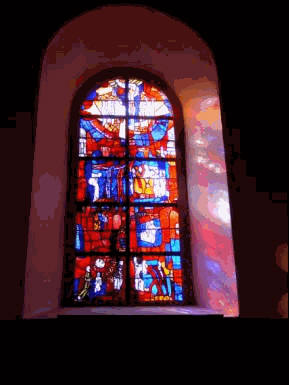
Outside on the square again my attention was caught by a modern sculpture, Europa greift nach den Sternen, (Europe reaches for the stars) by Helmut Lutz (2000). A massive bull appears to break through the stones of the square, and a stylized female figure stands, reaching upward, on its back. Breisach is very proud that it was the first town in Europe to declare itself in favour of a united Europe. Many sculptures around the town celebrate this.
Our walk now brought us to the Kapuzinergarten Restaurant, where we were due to eat lunch on the terrace. Its friendly proprietor, Engelbert Hau, met us at the door with apologies, but his terrace was crumbling and today, at long last, workmen had showed up to begin the repairs. It would be impossible to eat out there, but he would lead us through the scaffolding and machinery to look at the view we WOULD have looked over. He and his staff would then serve us a delicious lunch inside. Engelbert was quite a view himself, with an incredible long, curly beard. He pointed out the amazing beauty of his terrace view, then showed us to our seats.
Today I sat with Peggy, Ali and Lilly, and together we tried to translate the menu. The entrée was Perlhuhnkeule. We could see the chicken (Huhn) in the middle of that, but the precise species eluded us. Our young waiter (from Prague) spoke excellent English, but his vocabulary could only explain that it was some kind of `wild bird’. (Later research reveals Perlhuhnkeule to be guinea fowl.) It was accompanied by a 2003 dry Burgundy – and of course, we all had some expert vocabulary to describe that, after yesterday evening!
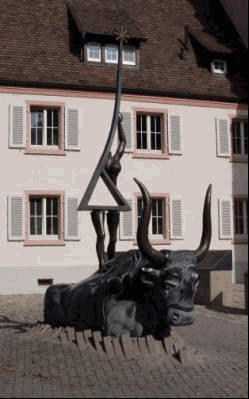 With many
thanks to Engelbert and his friendly staff, we left the restaurant in time
to walk down the hill to the banks of the Rhine, to catch our boat at two
o’clock. Most of us went immediately to the top deck of the boat, to make
the most of the still beautiful warm sunshine. We spread ourselves amongst
a few tables and relaxed. Coffee was available as the boat eased from the
dock and set off, with Germany on one bank and France on the other. We
enjoyed a lovely view of Breisach, crowned by St Stephen’s, as we pulled
away.
With many
thanks to Engelbert and his friendly staff, we left the restaurant in time
to walk down the hill to the banks of the Rhine, to catch our boat at two
o’clock. Most of us went immediately to the top deck of the boat, to make
the most of the still beautiful warm sunshine. We spread ourselves amongst
a few tables and relaxed. Coffee was available as the boat eased from the
dock and set off, with Germany on one bank and France on the other. We
enjoyed a lovely view of Breisach, crowned by St Stephen’s, as we pulled
away.
It was not a long cruise – about an hour. We steamed one way for a while, turned around, and came back, with Germany and France now reversed, of course. Gloria and I shared our solutions to educating the youth of today as we went.
Back on dry land, we had just time to walk back to the station, reverse our train journey, and be back in our hotels in Freiburg with a mere three hours to prepare ourselves for the conference banquet this evening. I had already washed my hair when I discovered that the hair dryer in our bathroom would not work! Strangely, after I put it back on its hook and talked to it, on my next attempt it worked perfectly. A mystic hairdryer? When Jim came back at about five I was delighted to hear he had had enough free time after the conference to make his own ascent of the cathedral tower. Not only that, but with his extra height he had been able to lean out far enough to get a much better angel picture – and had discovered that there are THREE angels, looking out over Freiburg in different directions!
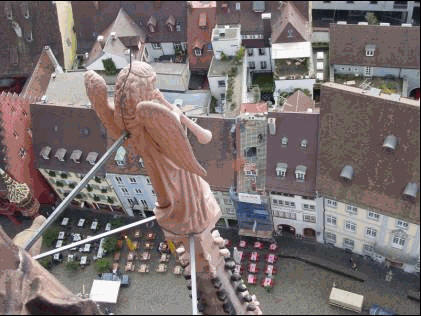
By seven o’clock, the scheduled time for our buses to collect us, we were downstairs in the hotel lobby in our banquet finery, our shoes shined and our hair curled. We believed it was quite a short drive to the Schlossbergrestaurant Dattler, a castle restaurant overlooking the town. We were very surprised when, on the way, our driver suddenly did a three-point turn in a narrow street and headed back downhill again. We met one of the other buses, and the drivers had a short, but evidently vital, conversation, after which we made another three-point turn. This was afterwards explained as `roadworks’, but after a longer journey than expected we were relieved to arrive safely at the castle. This fulfilled its reputation, as we were shown into a magnificent dining room with the last rays of the sunset, and the twinkling lights of Freiburg, laid out beneath us.
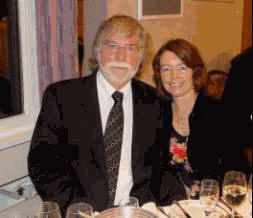 We sat at a
table with Vern and Rita, Peter and Gloria, and another couple I had not
previously met. Many of us rushed around and took pictures of each other
looking our best, before we got messy. Five courses were promised this
time, and an array of wine glasses indicated there would again be more
than enough samples of local wine to accompany them.
We sat at a
table with Vern and Rita, Peter and Gloria, and another couple I had not
previously met. Many of us rushed around and took pictures of each other
looking our best, before we got messy. Five courses were promised this
time, and an array of wine glasses indicated there would again be more
than enough samples of local wine to accompany them.
The meal and fellowship lived up to our expectations. Speeches and presentations followed, led by Ed, this year’s president. A bevy of beautiful ladies turned out to have been organizing the conference behind the scenes, and as each were presented with flowers Ed felt it his duty to kiss each one enthusiastically. This looked like so much fun, other gentlemen were moved to address female objects of their admiration and get in on the act. The trump card in this ceremony was played by a suave gentleman who presented decorated hearts to Marlyse, Peggy and Denise and took full advantage of the exchange.
At the end of the evening each guest was presented with a bottle of local wine, labelled with the conference title and date. Our buses took us back to our hotels by a comparatively direct route, and we were fortunate to share an elevator with Larry and Jo, who pressed one of their bottles of wine upon us.
That night I had extraordinary dreams, one of which indicates that my left brain intrudes where it should not. I was taking dictation from a German lady called Maria, and whenever I tried to write `uber alles’ it would come out misspelled as `uper alles.’ Who, in their `right’ mind, can dream of spelling mistakes?
Thursday 1 October was the day we were due to leave Freiburg. We breakfasted late, packed, and watched a little of the re-run of the presidential debate on CNN. Kerry seemed to have the edge in this one, more able to think on his feet, though not very specific on his `plan’. Bush was very definite, falling back frequently on repeated slogans, no matter what the question. Each was disappointingly more negative about the other than positive about his own solutions.
We left them to it and strolled into town for a last look round. The sun shone as we walked through the now familiar streets and out beyond the walls to a municipal garden.
We returned via the market in the Munsterplatz, where we bought ourselves an ethnic lunch. I also bought an Alsace ware egg cup made by Siegfried, a local craftsman. We met Jo, also browsing. We sat in the cathedral for a while listening to a service in progress.
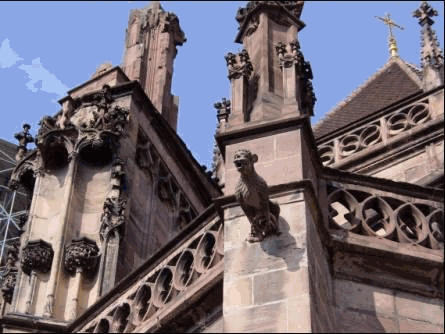
Jim found a convenient seat in a square where he could sit and paint for a while. I wandered off alone to find a last souvenir, a carved wooden angel, then sat in the sunshine beside him to update my diary and read a little more of my novel. Eventually we treated ourselves to apfel strudel and a coffee before we returned to our hotel to pick up our luggage.
We are such seasoned rail travelers now! We caught the 3:56 train to Cologne, and arrived there just after seven.
We had selected a different hotel, one close to Great St Martin’s on the banks of the Rhine. We remembered how to get there, we thought, and I had picked up a flyer from its lobby with the name Hotel Allegro printed clearly at the top. There was no such hotel in the spot where we left it! The mystery was solved as Jim left me and the luggage in a tidy heap to pursue enquiries, and he came back laughing with an identical flyer. At the BOTTOM it bore the name Hotel an der Philharmonie. These were two sister hotels who obviously shared advertising costs. We entered the Hotel an der Philharmonie, outside which we now stood, and found our room reserved there. Our room had a view of the cathedral, albeit just the tip of its spire over the rooftops, and it looked down on café tables and a taxi rank – of which more later.
We were in the Altstadt, an area of delightful narrow streets and picturesque buildings, and we now enjoyed a late evening walk there, searching for dinner. There were many choices, and we ended up just around the corner from our hotel at the Im Martinswinkel, with pavement seats looking out over the Rhine. Jim had a traditional pork dish, and I was not very hungry, so ordered goulash with fries on the side. (I’m a grown up – I can eat what I like!)
Fortunately we were tired when we returned to the hotel, as the cafes and bars beneath us were quite noisy, and though we fell asleep quickly I was wakened at one point by shouting. I looked out to find a drunk being lifted into a taxi by a group of friends.
We went to breakfast at about 8:30, sat in the window seat, and savoured cereal, fruit, crusty bread and jam. We packed before we went out, leaving our luggage downstairs, so we could enjoy Cologne until the last minute. I was determined to visit the Floating Angel in the Antonite Church this time, but on our first attempt we found the church closed. We walked on to St Aposteln, an originally Romanesque but much restored church, where I was delighted to find a modern stained glass window of what could easily be interpreted as stylized angels. Between the two holy sites we were amused by a monument to mammon – a huge mock ice cream cone upended on the corner of a modern art museum.
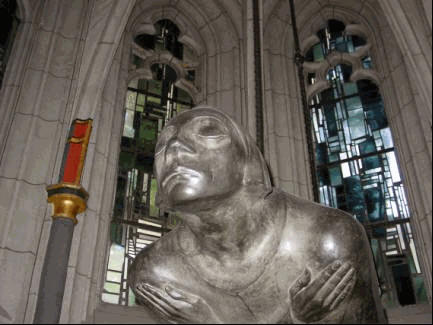
Finally, our timing was right for the Antonite church, and I was able to pay my respects to the famous Floating Angel, keeping watch over the memorial to those who had died in the World Wars. The original angel was created in 1926-27 by Ernst Barlach, but was removed and destroyed by the Nazis in 1937 because they considered it Degenerate Art. Friends of Barlach rescued the original plaster mould, and this was used to make the second cast, which has been hanging here since 1952.
We returned to the banks of the Rhine, where Jim had decided to spend some time painting the cluster of buildings around the base of Great St Martin’s. First we fortified ourselves with coffee and Apfelkuchen, then Jim staked out his spot.
I left him to walk again around the Altstadt, photographing the interesting little streets and traders’ signs, and also getting a very kind man to open his antique store specially so I could look at some egg cups in his window. Unfortunately they were each unmarked, but we enjoyed a pleasant conversation about the joys of collecting, and the beauty of Cologne.
We picked up our luggage from our hotel, and wheeled it to the station, reducing wear and tear on our wheels by using a mostly cobble-less route we had psyched out the night before. We had not reserved seats for this trip, so scanned the schedules for any train going to Dortmund. We found one leaving at 2:47 and took it.
After a while a ticket inspector came along, and we presented our pre-booked ticket and credit card as before. He told us we were on the wrong train! I asked if it went to Dortmund, and he said yes, it did, but it was an intercity train, and our ticket was for a slower local model. At this point we were about to offer to pay the difference when a young student sitting opposite intervened, explained that we spoke `only English’, and knew no better. We immediately switched to affable but clueless smiles, rather than apologies in German. The inspector spoke no English, decided it wasn’t worth his while to mess with us, and told us we could stay. The student, however, had made the same mistake, and was told to leave at the next stop to pick up the slower train!
I was reminded of a radio interview I had heard with a foreign-born English Member of Parliament, Ms Giessler, who described the advantages of being a foreigner. `Its liberating,’ she said. `You break half the rules because you don’t know what they are, then you can break the other half by pretending you don’t know what they are.’
We arrived in Dortmund at about four o’clock. My first impression was not favourable, as gangs of noisy youths in team colours were making all kinds of hullabaloo in and around the station.
We passed through them as quickly as possible, and walked through the town to the Mercure Hotel. This was strangely situated on the third floor of an elevator that started at street level and passed upward through other establishments, but our room was good. We looked out from this third level over an interesting street scene, and the spires of no fewer than two churches in the distance.
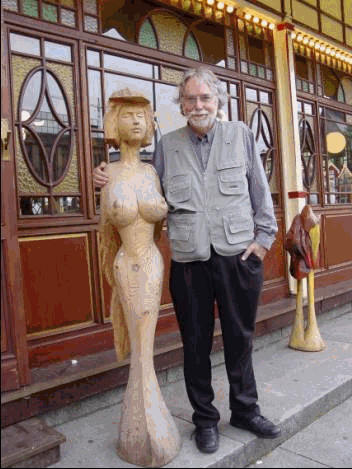 After a restorative cup of tea in our room, we set out to explore the
town, and found a serendipitous Oktoberfest celebration laid out for our
pleasure! We had a wonderful time strolling through the booths of food and
drink samples, entertainments, craft stalls, and happy crowds.
After a restorative cup of tea in our room, we set out to explore the
town, and found a serendipitous Oktoberfest celebration laid out for our
pleasure! We had a wonderful time strolling through the booths of food and
drink samples, entertainments, craft stalls, and happy crowds.
Local wood carving was particularly impressive, and I could not resist a carved wooden frog which could be stroked with a carved wooden stick to reverberate with `ribbit, ribbit.’
Jim found a magnificent carved mermaid, who was unfortunately too large to bring home with us, but we immortalized her standing with a smiling Jim.
We had to rise early on our last morning, with a taxi due to take us to Dortmund Airport at 8:00. Once again Easyjet served us well, and even without assigned seats I got a window and Jim got an aisle seat.
Our final steps went amazingly smoothly. Our luggage came through early, so we avoided a long line. A shuttle bus to Luton Parkway station was just about to leave, and we caught it. When we arrived, we had only four minutes to wait for a train to Flitwick A final walk down Kings Road got us home in time for lunch.